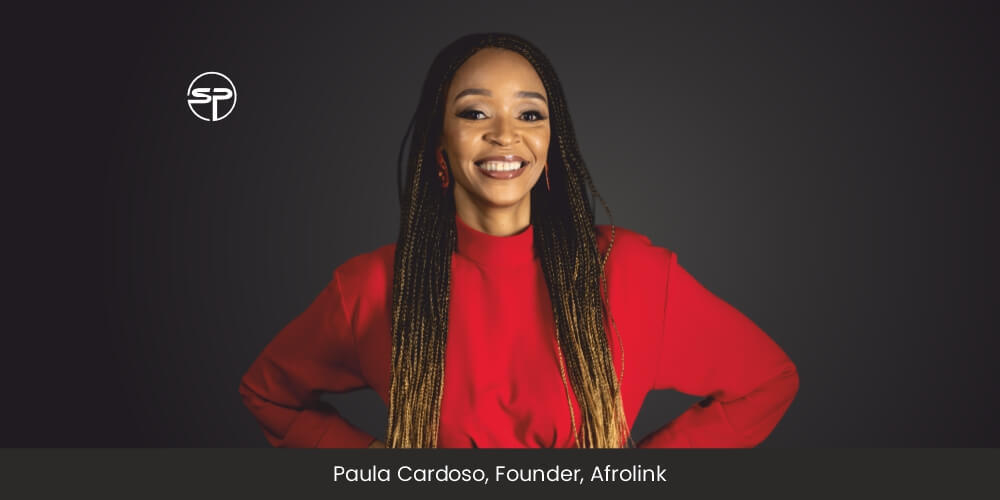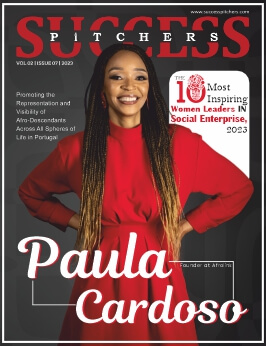Paula Cardoso: Promoting the Representation and Visibility of Afro-Descendants Across All Spheres of Life in Portugal
The 10 Most Inspiring Women Leaders in Social Enterprise, 2023

In Europe, racism and racial discrimination against people of African descent continue to be pervasive but unrecognised issues. It is time to acknowledge it and take action to more effectively combat afrophobia.
Paula Cardoso is the founder of Afrolink, a digital platform promoting the representation and visibility of afro-descendants across all spheres of life in Portugal. She was born on July 7, 1979, in the Mozambican city of Beira, and since the age of three, she has resided in Portugal. Even so, she never experienced any Portuguese feelings. Only as an adult is Paula able to process the racial traumas she carries because this sense of not belonging was brought on by anti-black racism and affected Paula’s self-love, self-esteem, and self-confidence in so many different ways.
Therapy has been Paula’s first step in identifying and overcoming the internalised oppressions that ultimately took away her power. Before starting her entrepreneurial journey, Paula also had to understand how racism was still working against her. She spent a lot of time studying black authors and academics and doing everything she could to comprehend the racist society in which people were living.
Paula worked hard to become a successful journalist before starting her own business. She is proud to say that, in 2019, she was the editorial director for the digital division of the Angolan newspaper Novo Jornal.
Back then, Paula had nearly two decades of experience as a journalist in well-established print news media both in Portugal (Visão and Sol) as well as in Angola (Expansão, Agora, and Novo Jornal).
Paula was starting a painful and challenging personal development process before quitting her position as director for the digital edition of Novo Jornal.
Fighting for Equality and Pride
Afrolink’s mission is to bring together African and African descendant professionals living in Portugal to share experiences, enhance skills, create alliances, publicize, and support businesses.
This “embassy” of the Afro workforce aims to promote greater black representation in the labour market and foster greater knowledge about the ethnic-racial diversity that exists in the country. The website and social media pages feature profiles of African and Afro-descendant professionals in Portugal, as well as articles on themes of interest for the daily life of the Black community in Portugal. Additionally, there are also in-person events to showcase black-owned businesses.
The Afrolink project is well aligned with the UN SDGs of “reduced inequalities” (SDG10), “partnerships for the goals” (SDG17), “decent work and economic growth” (SDGS8), and “sustainable cities and communities” (SDG11). Both Afrolink and Força Africana—a series of children’s books that advances the social inclusion of African and Afro-descendant children growing up in Portugal by featuring characters that resemble them—contribute to “gender equality” (SDG5) and “quality education” (ODS4).
Afrolink hosts a monthly entrepreneurs’ market to highlight black-owned businesses, and, in 2021, started a training programme to prepare and qualify young black journalists.
Sharing Stories that Touch Hearts
Paula uses her extensive writing experience for well-established print news media to create content that fights the prejudices and the biased narratives that portray black people in a very negative way in Portugal. She does this because she thinks words have the power to expose racism, encourage a stronger political commitment to combat inequality, and advance social justice. Paula adds that storytelling is a very powerful tool for capturing people’s attention while also fostering awareness of both individual and group journeys.
Paula is referring to the fact that by sharing the experiences of her people, she helps to humanise their stories and to visualise their accomplishments. She thinks that taking control of one’s own story not only empowers one but also promotes healing.
Lead by Example
Paula believes in the type of leadership that motivates action. She believes that the best way to lead someone is by demonstrating how something can be done, and she doesn’t have any problems adjusting from strategizing to carrying furniture and cleaning a space as necessary. “It’s about adjusting myself to the circumstances because sometimes things just don’t work out as we’ve planned, even if we do everything that we’re supposed to do,” she says.
Paula views leadership as a process she uses to encourage others to realise all of their potential. She thinks that it also involves igniting a desire for improvement, for being and becoming better.
Additionally, Paula believes that a humanised environment produces the best and most long-lasting results. A good leader works with and for people; instead of concentrating on the numbers, they should always be focused on the goal.
Creating Legacy
Paula feels very happy that people can relate to her mission, values, and purpose. She is absolutely convinced that for anyone to be considered a leader, a process of recognition by others must occur.
The point Paula is trying to make is that people see her as a business leader because she is a doer with a dream. Recently, someone told her that she is also a healer in the sense that she is contributing to raising awareness about racism through writing and as a speaker, but also because Paula is doing everything in her power to empower her community and create social impact. She asserts, “I have no words to express how grateful I am to see how people trust me with their stories and how they want to come together to make change happen.”
Paula is always saying that this is not about herself, that this is all about legacy. Her drive is to build a legacy for the black community and continue the revolution her ancestors started toward freedom and humanization. She states, “No doubt that my biggest inspiration and motivation come from those who paved the way for me. My work is a duty in memory of the enslaved and of each black person who fought for equality and who resisted oppression. I do because they did.”
Virtues of A True Leader
According to Paula, a successful leaders need to be extremely self-conscious. She believes that a successful leader is also someone who is passionate, optimistic, and a believer. Additionally, they must be dependable, adaptable, and willing to change and accept criticism. Because sometimes people need more authoritative leadership, Paula thinks it’s also important to listen and recognise which decisions can be discussed and which cannot.
Resilience is a quality that Paula values highly, along with communication and negotiation abilities. Paula hopes that the next generation of women will realise that following their dreams is not a competition. Feelings, convictions, self-consciousness, and acting at one’s own pace are crucial. That’s why women often end up living an even better dream than the one they had envisioned.
Every day is a New Challenge
Learning never stops, but one must be willing to acknowledge that mistakes are inevitable, and that failure is a necessary part of the journey. Paula frequently felt that because she was the only person of colour in the room, she was constantly on trial, had to prove her worth, and could only succeed by doing well.
Paula developed the idea that she belonged by performing well, but after realising how damaging this is, she just decided to make her journey more relatable. She says, “I guess that what I am trying to say is that racism is central to my life experience and that my career was impacted by its violence. I had to learn to say no, set my boundaries, and speak for myself instead of being apologetic.”
Now, Paula knows that it is ok to fail, to rest, and to ask for help. She learned to value herself and to stand for it.
Tales that Inspire
For Paula, the concept of a “management book” is wide open. If it motivates her to lead and inspires her to be better and to stand for what she believes, Paula considers that it benefits her management skills. She shares, “At the end of the day, what makes a difference is not a “to-do list” on a manual written by someone I can’t relate with, but the lessons from those who I feel represented by, and that paved the way for me.
It is more empowering to me to learn from African revolutionaries’ life stories, such as that of Samora Machel, the 1st President of Mozambique, or those of Amílcar Cabral, from Guinea-Bissau, or Winnie Mandela, from South Africa.”
Those biographies make Paula dream higher, boost her confidence, and reinforce her commitment to action. She doesn´t get this from a so-called “management book”.
Paula believes management is more about nurturing her soul to action than following some tips to achieve better results. Paula feels inspired by Michele and Barack Obama, as well as Bell Hooks, Maya Angelou, Tony Morrison, Lonnie Bunch, and Grada Kilomba, to name a few. Now she is reading “Assata: An Autobiography”.
Everyone Needs a Hero
When Paula was a child, she always had the same dream: to read a book featuring heroes and sheroes who looked like her. But the more she read, the more she noticed she didn’t belong. This made her think: “What are the consequences of this lack of diversity in the characters we typically find in children’s books?”
As far as Paula can tell, children who don’t see themselves portrayed begin to lose their ability to dream. To change this, she decided to create “Força Africana” (African Force), a collection of children’s books in the Portuguese language that promotes greater ethnic and racial diversity, featuring characters with whom black children can identify, promoting their self-esteem and sense of belonging.
Besides promoting greater ethnic and racial diversity in children’s books, “African Force” shares positive information about Africa as the stories unfold.
While working on “African Force” Paula realized that as important as creating black heroes and sheroes is to provide real black role models. That’s one of the reasons Paula founded Afrolink.
Bringing Change by Empowering Underprivileged
Paula’s future goal for Afrolink is to shape economic empowerment programs for the Afro-Portuguese community to: empower aspiring and existing entrepreneurs with knowledge and resources; increase representation in company boards and management positions; and expand access to finance and markets. She is also working to put into action an educational project designed to empower underprivileged communities through self-development programs.
Quotes:
“While telling the stories of my people I am humanizing our life experiences and helping to visualize our achievements. I believe that owning our narrative is not only empowering but also a process that brings healing”.
“I see leadership as a process through which I inspire others to reach their fullest potential. I would say that it is also about igniting motivation for change, for being better and making better”.
“Racism is central to my life experience, and my career was impacted by its violence. I had to learn to say no, set my boundaries, to speak for myself instead of being apologetic. Now I know that it is ok to fail, to rest, and to ask for help. I learned to value myself and to stand for it”.
“This is not about myself, that this is all about legacy. My drive is to build a legacy for the black community, to continue the revolution my ancestors started toward freedom and humanization”.
“My work is a duty of memory of the enslaved and of each black person who fought for equality and who resisted oppression. I do because they did”.
“I believe management is more about nurturing my soul to action than about following some tips to achieve better results.”
“When I was a child, I always had the same dream: to read a book featuring heroes and sheroes who looked like me. But the more I read, the more I noticed I didn’t belong. This made me think: What are the consequences of this lack of diversity in the characters we typically find in children’s books?”.
Website: https://afrolink.pt/










